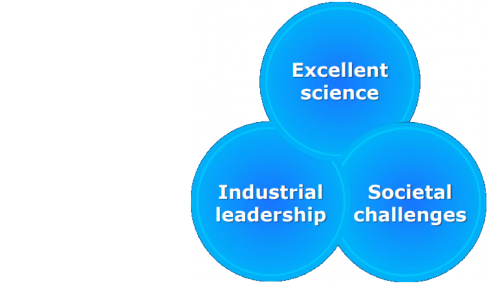Horizon 2020
Horizonte2020 Call’s: H2020 GPPQ
- H2020 documents
- Portuguese Research and Innovation Success Stories (PDF, 726 KB)
- EU Research and Innovation Success Stories (PDF, 391 KB)
Horizon 2020 is the biggest EU Research and Innovation programme ever created, covering the period between 2014 and 2020, it promises more breakthroughs, discoveries and world-firsts by taking great ideas from the lab to the market.
The Horizon 2020 Specific Programme is implemented through Work Programmes that are prepared by the European Commission within the framework provided by the Horizon 2020 legislation and through a strategic programming process integrating prioritized EU policy objectives, and setting out funding opportunities under the different parts through calls for proposals containing topics, and the other actions such as public procurements.
It is currently focused in 3 main pillars :
In addition to these three main priorities, there are other instruments that have a budget under the H2020.
The priorities and other instruments that make up Horizon 2020 are designated in the following H2020 Sections:
- European Research Council
- Future and Emerging Technologies
- Marie Skłodowska-Curie actions
- Research Infrastructures, including e-Infrastructures
III) Societal Challenges
- Health, Demographic Change and Wellbeing
- Food Security, Sustainable Agriculture and Forestry, Marine, Maritime and Inland Water Research and the Bioeconomy
- Secure, Clean and Efficient Energy
- Smart, Green and Integrated Transport
- Climate Action, Environment, Resource Efficiency and Raw Materials
- Europe in a changing world – Inclusive, innovative and reflective societies
- Secure societies – Protecting freedom and security of Europe and its citizens
IV) Spreading Excellence and Widening Participation
V) Science with and for Society
VI) European Innovation Council (EIC) Pilot
VII) Focus areas
VIII) European Institute of Innovation and Technology (EIT)
IX) Euratom
Horizon 2020 employs different forms of funding, such as grants, prizes, procurement and financial instruments
| Types of Action | Action Code | Minimum Conditions for Participation | Financing conditions | Typical Duration | Aim & Details |
|---|---|---|---|---|---|
| Research and Innovation Action | RIA | ≥ 3 legal entities from 3 Member States or Associated Countries | 100% | 36-48 months | Collaborative research projects of R&D aiming to establish new knowledge or explore the feasibility of a new technology, product, process, service or solution (including basic and applied research, technology development and integration, testing and validation on a small-scale prototype in a laboratory or simulated environment) |
| Innovation Action | IA | ≥ 3 legal entities from 3 Member States or Associated Countries | 100% | 30-36 months | Innovation activities directly aiming at producing plans and arrangements or designs for new, altered or improved products, processes or services (including prototyping, testing, demonstrating, piloting, large-scale product validation and market replication) |
| Coordination and Support Action | CSA | 1 legal entity from 1 Member State or Associated Country | 100% | 12-30 months | Accompanying measures (standardization, dissemination, policy dialogues etc.) No research. |
| ERC Grants – Starting Grant | ERC-StG | 1 legal entity from 1 Member State or Associated Country | 100% | 60 months | Support excellent investigators and their research teams to pursue groundbreaking, high-gain/high-risk research. 1 researcher; 1 host institution; 1 project; 1 selection criterion: scientific excellence, No consortia, no networks, no co-financing.
Young, early-career top researchers (2-7 years after PhD) ≤ 1.5 M€ (5 years); Independent excellent researchers (7-12 years after PhD) ≤ 2 M€ (5 years); Senior research leaders with significant research achievements in the last 10 years ≤ 2.5 M€ (5 years) |
| ERC Grants – Advanced Grant | ERC-AdG | 1 legal entity from 1 Member State or Associated Country | 100% | 60 months | |
| ERC Grants – Consolidator Grant | ERC-CG | 1 legal entity from 1 Member State or Associated Country | 100% | 60 months | |
| ERC Grants – Proof of Concept Grant | ERC-PoC | 1 legal entity from 1 Member State or Associated Country | 100% | 18 months | Maximize the value of excellent research that the ERC funds, by funding further work (i.e. activities which were not scheduled to be funded by the original ERC frontier research grant) to verify the innovation potential of ideas arising from ERC funded projects, granting holders who want to check the market and/or innovation potential of research results from ERC-projects
≤ 150 m€ (12 months) |
| ERC Grants – Synergy Grants | ERC | 1 legal entity from 1 Member State or Associated Country | 100% | 72 months | Promote substantial advances in the frontier of knowledge, and to encourage new productive lines of enquiry and new methods and techniques, including unconventional approaches and investigations at the interface between established disciplines |
| Marie Sklodowska-Curie Actions – Innovative Training Networks (ITN) | MSCA-ITN | European Training Networks (ETN) ≥ 3 different Member States or Associated Countries
European Industrial Doctorates (EID) ≥ 2 different Member States or Associated Countries (at least one beneficiary must be entitled to award doctoral degrees and at least one beneficiary must come from the non-academic sector, primarily enterprises) European Joint Doctorates (EJD) ≥ 3 different Member States or Associated Countries (at least 3 beneficiaries must be entitled to award doctoral degrees). |
100% | 3-36 months
Researchers in EID shall spend at least 50% of their time in the non-academic sector. |
Provide grants for all stages of researchers’ careers and encourage transnational, intersectoral and interdisciplinary mobility. Enable research-focused organizations (universities, research centers, and companies) to host talented foreign researchers and to create strategic partnerships with leading institutions worldwide. The MSCA aim to equip researchers with the necessary skills and international experience for a successful career, in either the public or the private sector. The programme responds to the challenges sometimes faced by researchers, offering them attractive working conditions and the opportunity to move between academic and other settings. The MSCA are open to all domains of research and innovation, from fundamental research to market take-up and innovation services. The applicants (individuals and/or organizations) in a fully ‘bottom-up’ manner choose research and innovation fields freely.
MSCA-ITN: Support competitively selected joint research training and/or doctoral programmes, including industrial doctorates to provide experience outside academia, hence developing innovation and employability skills. Living allowance: €3110/month Mobility allowance: €600/month Family allowance: €500/month Research, training and networking costs: €1800/month Management and indirect costs: €1200/month Researchers shall not have resided or carried out their main activity (work, studies, etc) in the country of their host organization for more than 12 months in the 3 years immediately prior to the reference date. MSCA-IF: Support for experienced researchers undertaking mobility between countries, optionally to the non-academic sector. Individual Fellowships support the mobility of researchers within and beyond Europe – as well as helping to attract the best foreign researchers to work in the EU. The grant usually covers two years’ salary, a mobility allowance, research costs and overheads for the host institution. Individual researchers submit proposals for funding in liaison with their planned host organization. Proposals are judged on their research quality, the researcher’s future career prospects, and the support offered by the host organization. Fellows can also spend part of the fellowship elsewhere in Europe if this would boost impact, and those restarting their career in Europe benefit from special eligibility conditions Living allowance: €4650/month Mobility rule that at the time of the deadline for submission of proposals, researcher must not have resided or carried his/her main activity (work, studies, etc.) in the country of the host organization for more than 12 months Mobility allowance: €600/month Family allowance: €500/month MSCA-RISE & MSCA-CO-FUND: RISE supports short-term mobility of research and innovation staff at all career levels, from the most junior (post-graduate) to the most senior (management), including also administrative and technical staff. It is open to partnerships of universities, research institutions, and non-academic organizations both within and beyond Europe. In worldwide partnerships, academia-to-academia exchanges are permitted. Co-funding of regional, national and international programmes that finance fellowships involving mobility to or from another country. The MSCA offer additional funding to regional, national and international programmes for research training and career development. COFUND programmes encourage the movement of researchers across borders and provide good working conditions. The scheme can support doctoral and fellowship programmes. MSCANIGHT: It is a Europe-wide public event to stimulate interest in research careers, especially among young people. The activities are focused on the public and might take various forms such as hands-on experiments, science shows, debates, competitions or quizzes. The NIGHT takes place yearly, typically on the last Friday of the month of September. Bring researchers closer to the general public and to increase awareness of research and innovation activities Co-funding of regional, national & international doctoral & fellowship programmes Early-stage researchers: €3710/month Experienced researcher: €5250/month Institutional unit cost: €650/month |
| Marie Sklodowska-Curie Actions – Individual fellowships (IF) | MSCA-IF | Beneficiary shall be a participant located in EU Member State or Associated Country and employing the researcher during the project. | 100% | IF European: 12 – 24 moths.
IF Global: 12-24 months for the outgoing phase plus 12 month return phase in Europe |
|
| International and inter-sectoral cooperation through the Research and Innovation Staff Exchanges (RISE) | MSCA-RISE | ≥ 3 legal three different countries of which at least two must be EU Member States or Associated Countries. If all participants are from the same sector (either only academic or only non-academic), at least one participant must be from a third country. | 100% | 1-12 months | |
| The European Researchers’ Night (NIGHT) | MSCA-NIGHT | Legal entity for 1 Member State or Associated Countries, and/or if relevant, constitute a partnership at regional, national or international level. | 100% | 24 months | |
| Marie Sklodowska-Curie Actions – Co-fund | MSCA-CO-FUND | 1 legal entity from 1 Member State or Associated Country | 50% | 36-60 months | |
| Prizes | PRI | 1 legal entity from 1 Member State or Associated Country | N.A | N.A | Recognize past achievements; induce future activities. The European Union Contribution is Variable |
| SME Instrument | SME | 1 SME Member State or Associated Country | Variable | ≤ 24 months | Combination of demonstration activities (testing, prototyping …) market replication.
3 Phases: Phase 1 – Lump sum of €50 K /project Phase 2 – 1 to 2.5 million /project (1-2 years) Phase 3 – no funding |
| Fast Track to Innovation | FTI | ≤ 5 legal entities from 5 Member States or Associated Countries | 100% | Variable | Produce plans & arrangements or designs for new, altered or improved products, processes or services.
≤ €3 million |
| ERA-Net`s | ERA-NET | ≥ 2 legal entities from 2 Member States or Associated Countries | 33% | 60 months | Coordinate research efforts of participating Member States or Associates Countries in the field described & implement joint transnational call for proposals with EU co-funding.
The European Union Contribution is Variable |
| Pre-Commercial Procurement | PCP | ≥ 3 public procurers from 3 Member States or Associated Countries | 70% | 18-48 months for 2 phases: Phase 1 – Preparation Phase 2 – Execution | Enable the public sector as a technologically demanding buyer to encourage research, development and validation of breakthrough solutions in areas of public interest.
European Union Contribution is Variable |
| Public Procurement of Innovative Solutions | PPI | ≥ 3 public procurers from 3 Member States or Associated Countries | 20% | 18-48 months for 2 phases: Phase 1 – Preparation Phase 2 – Execution | Enable transnational buyer groups of procurers to share the risks of acting as early adopters of innovative goods or services, which are not yet available on a large-scale commercial basis.
The European Union Contribution is Variable |
| *associated countries | |||||

